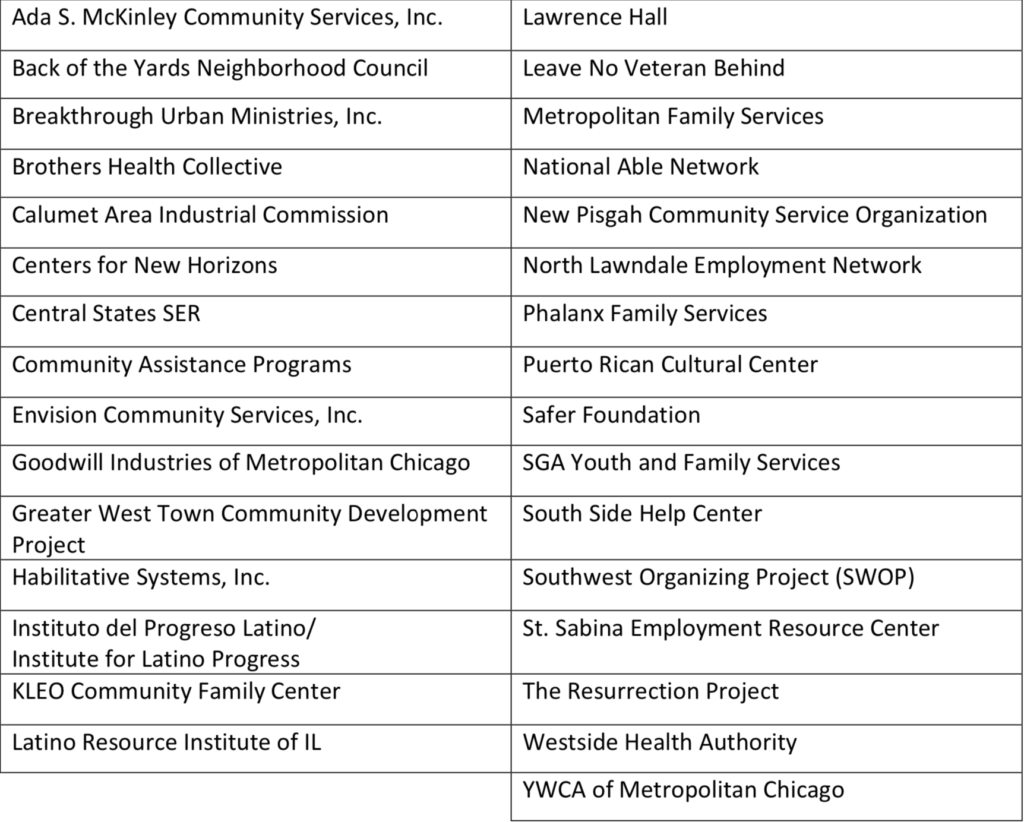The Partnership Announces 31 Community Based Organizations Selected to Create City’s COVID Contact Tracing Corps
Download the press release here.
CBOs chosen in a competitive RFP process will employ roughly 500 contract tracing positions to stem COVID-19 transmission in Chicago
(Chicago) – The Chicago Cook Workforce Partnership (The Partnership) joins Mayor Lori E. Lightfoot to announce the 31 Community Based Organizations (CBOs) selected to hire individuals for Chicago’s COVID Contact Tracing Corps (Corps). In July, The Partnership received a two-year, $56 million grant from the City of Chicago and the Chicago Department of Public Health (CDPH) to serve as the Lead Coordinating Organization overseeing this program.
“As a city, it is our responsibility to ensure all our residents are safe and supported during these uncertain times,” said Mayor Lightfoot. “By creating much-needed jobs to support our city-wide response to COVID-19, the COVID Contact Tracing Corps and Resource Coordination Hub will help communities impacted the most by this disease to stay afloat and invest in their career pathways. We are proud to partner with The Partnership and our CBOs on this one-of-a-kind initiative and look forward to working together to continue empowering residents as they create the bright futures they deserve.”
The Partnership and its collaborators will offer the contact tracers ongoing professional development and “Earn and Learn” opportunities designed with input from public health experts and private sector institutions. Through the Earn and Learn program, participants can gain credentials and permanent placement in allied health and adjacent occupations.
The CBOs named today will hire and supervise the Corps consisting of approximately 500 contact tracers and supervisors, earning $20 and $24 an hour respectively. Contact tracers may work full or part-time hours.
“We are excited to lead this corps of dynamic community organizations of all sizes to offer meaningful employment opportunities through contact tracing jobs and beyond,” said Karin M. Norington-Reaves, CEO of The Partnership. “This initiative furthers our mission of providing economic empowerment through employment.”
The Partnership administered a competitive procurement process targeting communities in need that received more than 70 applicants. The CBOs selected are listed below:

“Chicago’s COVID Contact Tracing Corps is critical to the Latinx community,” said Craig Chico, President of the Back of the Yards Neighborhood Council. “Many of the residents we serve are essential workers or share a home with many generations of their families and thus are especially vulnerable to this virus. This opportunity to be a CBO working with The Partnership to hire and train contact tracers and provide support for those exposed or infected aligns with our mission and the work we do every day.”
‘We are proud to be part of Chicago’s Community-Based Contact Tracing Corps program,” said Keisha Davis-Johnson, Executive Director of the Greater West Town Community Development Project. “Our mission is to expand employment opportunities for African American and Latinx residents of Chicago’s West Side. Being part of this program, at this time, is a historic opportunity to help stem a public health crisis while offering participants an opportunity to gain skills in the high-demand health care sector.”
The Community-Based Contact Tracing Corps supplements existing CDPH efforts to address the pandemic. CDPH has been conducting contact tracing throughout the pandemic and it is critical to helping slow transmission of COVID-19 in our communities. Beyond the Corps and the ongoing governmental public health contact tracing model, CDPH is also partnering with external healthcare facilities to roll out their own contact tracing programs. CDPH is allocating $14 million across three different types of healthcare facilities in Chicago to do this work: Federally Qualified Health Centers (FQHCs), the Ambulatory and Community Health Network (ACHN) Clinics of Cook County located in the City of Chicago, and hospitals.
Partner organizations in the Community-Based Contact Tracing program are: the University of Illinois at Chicago’s School of Public Health (UIC); Malcolm X College, one of the City Colleges of Chicago; Sinai Urban Health Institute; and NORC at the University of Chicago. Together, the Corps and the Resource Coordination Hub will bolster efforts to stem the transmission of COVID-19 in the City’s hardest-hit neighborhoods.
Tracers will participate in training and receive certification through Malcolm X College, one of the City Colleges of Chicago. The University of Illinois at Chicago School of Public Health will help train contact tracers, consult on the Resource Coordination Hub and provide access to educational programs for the earn and learn initiative. Sinai Urban Health Institute (SUHI) will assist in onboarding and training the contact tracing corps and also provide earn and learn services. NORC at the University of Chicago will lead the development of the Hub which will serve as a central call center and location to refer diagnosed individuals (and those who have had sustained contact with them) for testing, treatment, social services, and other resources.
Prospective tracers can register their interest at Chitracing.com a portal created by The Partnership for this program. CBOs will begin hiring immediately.
###
ABOUT THE PARTNERSHIP
The Chicago Cook Workforce Partnership (The Partnership) is a non-profit umbrella organization operating the public workforce system for the City of Chicago and Cook County. The Partnership combines federal and philanthropic resources to provide comprehensive workforce development services to employers and job seekers. As the largest workforce development system in the nation, The Partnership has helped place more than 70,000 individuals in employment; collaborated with more than 2,000 employers; and administered more than $400 million in federal and philanthropic funds. The Partnership’s network of 50+ community-based organizations, 10 American Job Centers, and four sector-driven workforce centers serves more than 140,000 people annually. Learn more at www.chicookworks.org.
